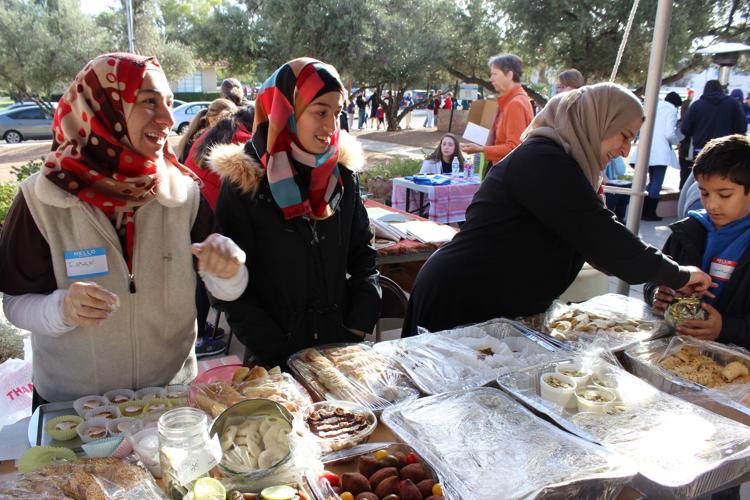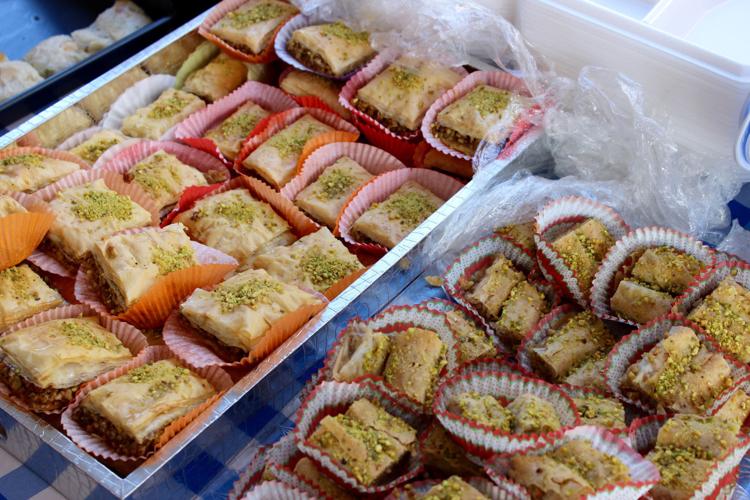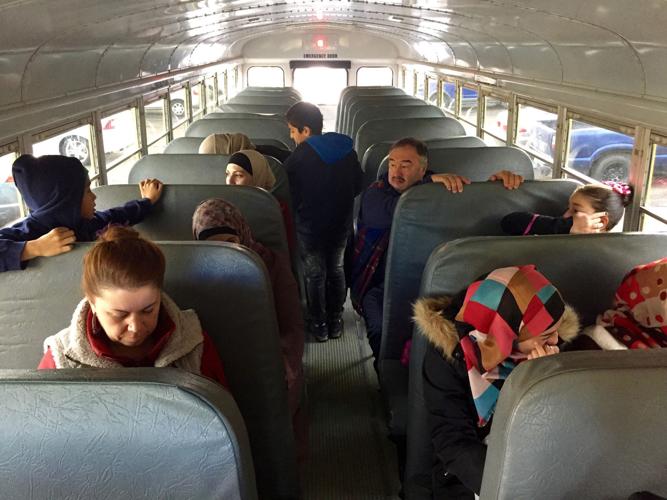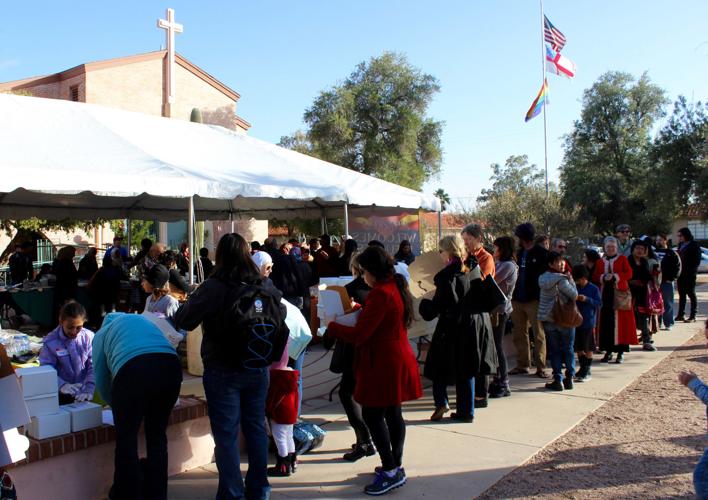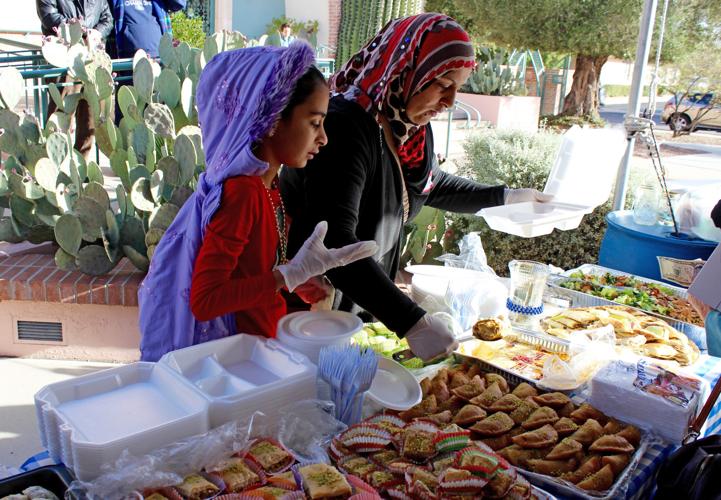The Pastry Party Bus rolled up to the Syrian Sweets Exchange to cheers.
Volunteers and a few hungry customers already in line clapped and waved at the school bus carrying about a dozen Syrian refugees and their platters of baked goodies.
A few of the bus riders laughed at the warm welcome. This was all for them.
For the second weekend in a row, Syrian women and their families had gathered at Grace St. Paul’s Episcopal Church, 2331 E. Adams St., to sell treats from their kitchens.
Many had been baking for days, using recipes passed on to them by mothers and grandmothers, to share with the Tucson community.
Organized by members of Arizona Welcomes Refugees, a group started by state Sen. Steve Farley, the first Syrian Sweets Exchange on Sunday, Dec. 11, drew such a crowd that it sold out within the first hour, said Nour Jandali, a member of Tucson’s Syrian community. Jandali moved to the U.S. from Syria about 23 years ago.
Melanie Cooley, an organizer of the event, guessed that anywhere between 300 and 400 customers came to the first bake sale.
Cooley estimated as many as 500 people showed up the second time around.
The next Saturday, they handed out about 375 pastry boxes. That’s not including all of the customers who shopped without a box.
One guy even brought his own Tupperware container.
Many came shopping for Christmas gifts or desserts for a holiday party.
The women took the first week’s success seriously. On the second weekend, they stuffed their tables with treats instead of bringing just a few platters.
A few extra women also joined the mix that week, bringing the total head count of bakers to about 20, Cooley said.
The attitude: “You want food? We will bring you food,” Cooley added.
And bring it they did.
Some of the women began gathering around 8 a.m. that Saturday at an apartment complex to board the Syrian Sweets Express — a school bus borrowed from the Islamic Center of Tucson’s Al-Huda Islamic School. The bus made several pickups on the way to the church.
For some women, getting around can be a challenge if the family lacks a car or only the husband has a driver’s license and is working.
Hence the bus.
As the event started and customers streamed between tables, some children wandered the area while others stayed close to their mothers, helping sell tables full of sweets, cups of Syrian coffee and more savory samplings.
Money changed hands and so did languages, with the women saying, “Thank you” and the customers learning the Arabic: “Shukran.”
Each family keeps 100 percent of the money earned, putting it toward bills that pile up or gifts for children.
The bake sale opened at 9:30 a.m. and finished two hours later. A line of people waited outside the tent until nearly 11 a.m.
Sarah Gzemski, a publicity and publications coordinator for the University of Arizona’s Poetry Center, hit up the bake sale the first time with friends, but by the time they arrived, many of the sweets were gone.
The second weekend, Gzemski got up early and was one of the first in line.
“It was amazing and full,” she said the first bake sale. “So many people came out. It was joyful and everyone was just enjoying their sweets.”
For many of the women baking, the sales meant a chance to get out of the house and interact with the greater community and one another.
“I’m very happy to be here and working with the ladies from Syria to serve the community,” said Ahed Al Asmi, a 26-year-old mom of three from Daraa, Syria, whose family has been in the U.S. for about three months.
Rania Kanawati, an organizer and Tucsonan who moved to the U.S. from Syria more than 20 years ago, translated.
Marwa Al Fandi, 27, is also from Daraa. Her family has been here for four months.
Baking for Tucson has kept her busy — a welcome distraction from recent events the previously besieged city of Aleppo, where many of these families still have connections.
“People want to help Aleppo,” Farley said at the bake sale. “This is a very tangible way to help.”
And for these women and their families, the community support at the bake sales overcame any sort of language barrier.
“They were so happy because first of all, they see on TV that the U.S. does not want Syrians,” Jandali said.
“But then they see all of these Tucson people. ... They were telling people, ‘We are glad we came to Tucson because they are welcoming here.’”
In the Middle East, Syria has a reputation for its sweets, Cooley said she has learned.
Not only has the bake sale given these women something to do, but now they have something to offer.
“I was visiting with another one of my friends this week and she was talking about how meaningful it is for her to get to share Syrian culture and to get to share who they are,” Cooley said.
“Food is really integral to their culture and hospitality and the preparing of food, and they are quite passionate about it, so getting to share that with a new neighbor and connect with people through food and being able to actually offer something is really meaningful to them.”
This is not the last time Tucson will have a chance to sample Syrian sweets, organizers said. An email subscription will keep interested people up-to-date on Syrian sweets in Tucson. This is only the start.
“They don’t need language for this,” Farley said. “When you cook the most delicious sweets ever, that speaks louder than any language.”


